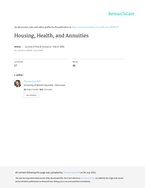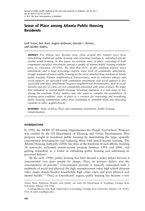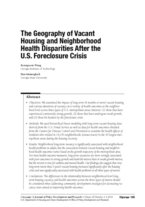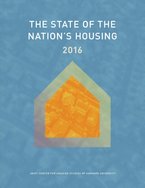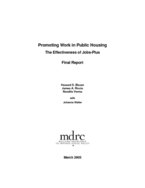Found 67 resources.
0
0
0

Many low-income families in the United States face challenges associated with unemployment, health, and education disparities. To help overcome these challenges, several federal programs aim to assist these families with employment, self-sufficiency, healthy relationships, and individual well-being. Understanding the effects of these programs, including whether they meet the needs of those they intend to serve, requires a strong partner. Mathematica’s team of seasoned experts has worked closely with the Administration for Children and Families (ACF), Office of Planning, Research, and...
Topics: Asset building, Child welfare, Dual-generation, Family engagement, Low-income, Research, Stability
0
0
0
In contrast to the portrayal of homelessness as affecting people with behavioral health problems or low employment capacity, cycles of homelessness could reflect job shifts that bring a household in or out of poverty. To assess the connections between employment and homelessness, researchers focused on three topics: (1) employment and earnings before, during, and after adults used a homeless shelter; (2) changes in employment and earnings in connection to shelter entry and exit; and (3) employment and earnings differences between adults who are homeless as part of a family versus as...
Topics: Asset building, Homelessness, Housing, Low-income, Research, Stability, Workforce development
0
0
0

Some community colleges have found innovative partnerships with their public housing authorities may help combat student homelessness.
Topics: Asset building, CLPHA, Education, Homelessness, Housing, Low-income, Midwest, Pacific Northwest, Partnerships, Post-secondary, Stability, Workforce development
0
0
0
Which neighborhoods in America offer children the best chance to rise out of poverty? The Opportunity Atlas answers this question using anonymous data following 20 million Americans from childhood to their mid-30s. Now you can trace the roots of today's affluence and poverty back to the neighborhoods where people grew up. See where and for whom opportunity has been missing, and develop local solutions to help more children rise out of poverty.
Topics: Asset building, Child welfare, Dual-generation, Early childhood, Education, Health, Housing, Low-income, Mobility, Stability, Youth
 Shared by Housing Is
on Oct 12, 2018
Shared by Housing Is
on Oct 12, 2018 0
0
0

In 17 years, the Family Independence Initiative has enrolled 3,000 families — four people per household on average — and is operating in 14 different cities across the country. Now the initiative is making a move into 10 neighborhoods across Chicago. With a $2.6 million backing from Google.org and the City of Chicago, the organization hopes to combat poverty and improve the quality of life for 1,000 families on the South and West sides by giving money directly to them while also strengthening their social ties.
Topics: Asset building, Low-income, Midwest, Workforce development
0
1
1

Our initial report—which followed participants around the country over three years—found, among other things, that Year Up increased participants’ average quarterly earnings by more than 50 percent. These are the largest gains in earnings measured to date in random assignment studies of workforce training programs for youth and adults.
Topics: Asset building, Education, Low-income, Mobility, Post-secondary, Research, Workforce development, Youth
 Shared by Housing Is
on Aug 16, 2018
Shared by Housing Is
on Aug 16, 2018 0
0
0
Annuities, long-term care insurance (LTCI), and reverse mortgages appear to offer important consumption smoothing benefits to the elderly, yet private markets for these products are small. A prominent idea is to combine LTCI and annuities to alleviate both supply (selection) and demand (liquidity) problems in these markets. This paper shows that if consumers typically liquidate home equity only in the event of illness, then LTCI and annuities become substitutes and less attractive. Simulations confirm that without home equity loans, both LTCI and constant real annuities may be welfare...
Topics: Asset building, Health, Housing, Medicaid / Medicare, Seniors
 Shared by Housing Is
on Aug 9, 2018
Shared by Housing Is
on Aug 9, 2018 0
0
0
For almost two decades now, cities around the country have been demolishing traditional public housing and relocating residents to subsidized private market rental housing. In this paper, we examine sense of place, consisting of both community and place attachment, among a sample of Atlanta public housing residents prior to relocation.
Topics: Asset building, Housing, Legislation & Policy, Low-income, Mental health, Mobility, Research, South, Stability
 Shared by Housing Is
on Aug 9, 2018
Shared by Housing Is
on Aug 9, 2018 0
1
0
We examined the impact of long-term (6 months or more) vacant housing and various durations of vacancy on a variety of health outcomes at the neighborhood level across three types of U.S. metropolitan areas (metros): (1) those that have experienced consistently strong growth, (2) those that have undergone weak growth, and (3) those hit hardest by the foreclosure crisis
Topics: Asset building, Asthma, Community development, Health, Housing, Low-income, Mental health, Metrics, Research, Safety, Transportation
 Shared by Housing Is
on Aug 1, 2018
Shared by Housing Is
on Aug 1, 2018 0
0
0
SAHF members believe that connecting residents of affordable housing with needed supports – such as educational resources or health services – can help vulnerable families and seniors achieve
a better quality of life. SAHF began the Outcomes Initiative to create a common framework for its members to demonstrate with data the impact on residents of providing housing-based services and support in the five key areas listed below.
Topics: Asset building, Cost effectiveness, Dual-generation, Education, Exercise, Food insecurity, Health, Housing, Mental health, Metrics, Nutrition, Safety, Stability
 Shared by Housing Is
on Jul 26, 2018
Shared by Housing Is
on Jul 26, 2018 0
0
0
The need for more affordable rental housing is urgent. The record number of renters paying more than half their incomes for housing underscores the growing gap between market-rate costs and the rents that millions of households can afford. Governments at all levels must redouble their efforts to expand the affordable supply. And with growing recognition that children’s lifelong achievement rests on stable, safe, and healthy living conditions, policymakers must also ensure better access of minority and low-income households to higher opportunity communities.
Topics: Asset building, Housing
 Shared by Housing Is
on Jul 20, 2018
Shared by Housing Is
on Jul 20, 2018 0
0
0
As prospects seem to diminish for the next generation being
better off than the current one, it is essential to elevate the
successful work being done to address intergenerational
poverty and create an intergenerational path of opportunity.
Practical State Solutions profiles effective solutions from Ascend
partners throughout the United States and the work driven by
leaders in Colorado, Connecticut, Florida, Georgia, Maryland,
Minnesota, Tennessee, and Utah. It contains recommendations
on processes that lead to better outcomes for families, lessons
learned on engaging and bringing families to...
Topics: Asset building, Child welfare, Criminal justice, Dual-generation, Early childhood, Family engagement, Funding, Health, Legislation & Policy, Post-secondary, Workforce development
 Shared by Housing Is
on Jul 19, 2018
Shared by Housing Is
on Jul 19, 2018 0
0
0
This final report on MDRC’s evaluation of Jobs-Plus describes the program’s impacts, that is, the difference it made for residents in Jobs-Plus developments in comparison with residents living in similar developments who did not receive the program. These findings offer important lessons to policymakers and program administrators about how to increase the economic self-sufficiency of public housing residents.
Topics: Asset building, Community development, Cost effectiveness, Legislation & Policy, Metrics, Research, Workforce development
 Shared by Housing Is
on Jul 17, 2018
Shared by Housing Is
on Jul 17, 2018 0
0
0
How does housing affect your family's well-being?
Topics: Asset building, Asthma, Child welfare, Early childhood, Education, Health, Housing, Stability
 Shared by Housing Is
on Jul 12, 2018
Shared by Housing Is
on Jul 12, 2018 0
0
0
Over the past year, the United States Conference of Mayors and the Brookings Institution, along with the Project for Public Spaces have worked together to capture a new model of growth that is emerging in cities and the particular roles that mayors can play.
Topics: Asset building, Community development, Cost effectiveness, Funding, Legislation & Policy, Place-based, Research
 Shared by Housing Is
on Jul 5, 2018
Shared by Housing Is
on Jul 5, 2018 0
0
0

Why do some neighborhoods appear able to launch effective local improvement initiatives, while others are more hampered by fragmentation and mistrust? Why can some communities mobilize diverse constituencies to influence public policy, while others cannot? Answers to these questions may be found in the specific patterns of collaboration that form among community organizations, and between these groups, schools, public agencies, and elected officials, according to MDRC, a preeminent social-policy research organization.
Topics: Asset building, Child welfare, Community development, Data sharing, Dual-generation, Education, Family engagement, Funding, Health, Housing, Legislation & Policy, Low-income, Metrics, Midwest, Mobility, Out-of-school time, Partnerships, Place-based, Preventative care, Research, Safety, Stability, Workforce development, Youth
0
0
0
Increasingly, a wide range of entities—housers, educators, cities—are using data sharing as a way to increase effectiveness across systems. Data sharing exemplifies this community of practice’s intent to align systems to improve life outcomes for low-income children. We have many robust examples on the local level and this panel will discuss what data systems beyond local partners can look like and accomplish.
Dennis Culhane, Co-Principal Investigator, Actionable Intelligence for Social Policy, University of Pennsylvania School of Social Policy & Practice
Topics: Asset building, CLPHA, Data sharing, Education, Housing, Low-income, Metrics, Partnerships, Research
 Shared by CLPHA Admin
on Jan 8, 2018
Shared by CLPHA Admin
on Jan 8, 2018 - « first
- ‹ previous
- 1
- 2
- 3

